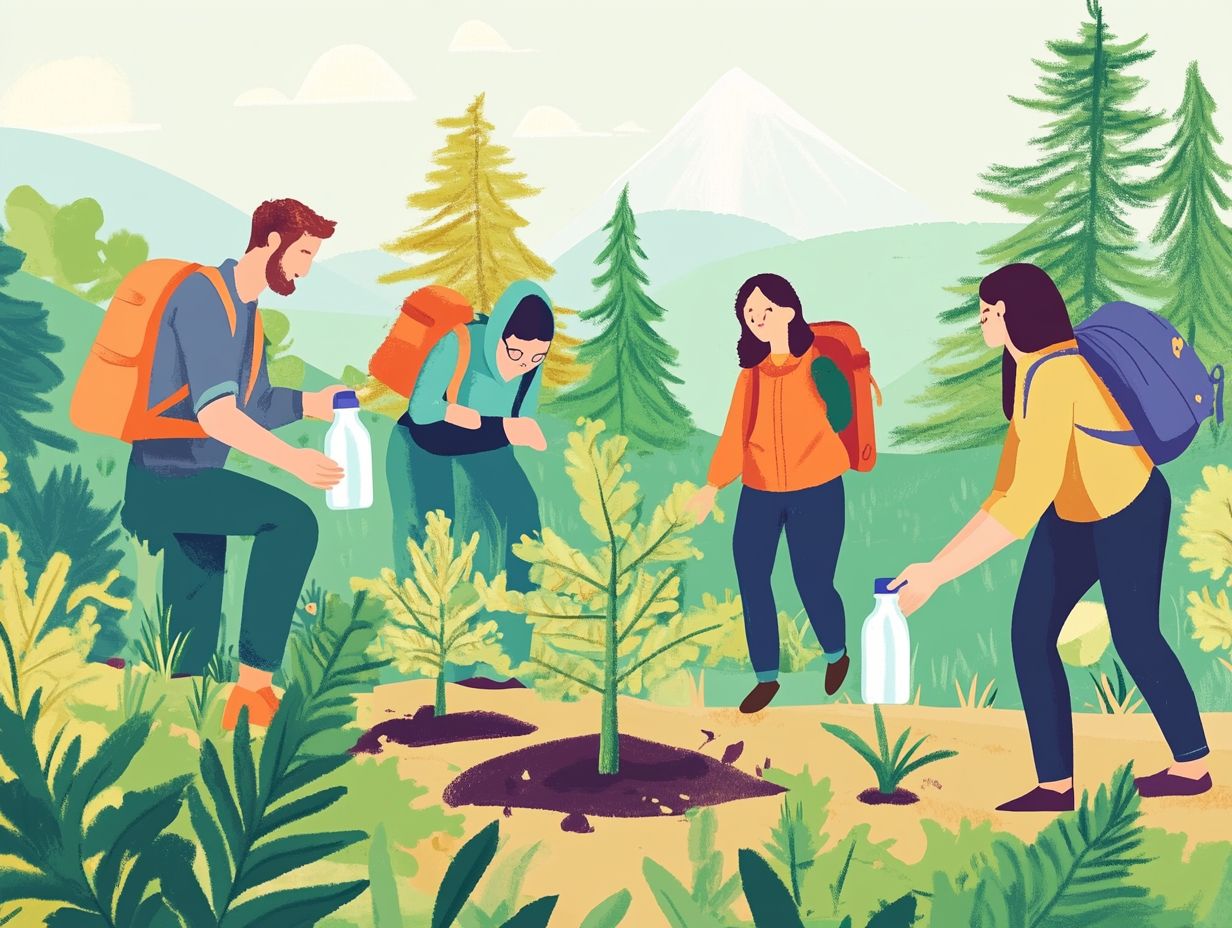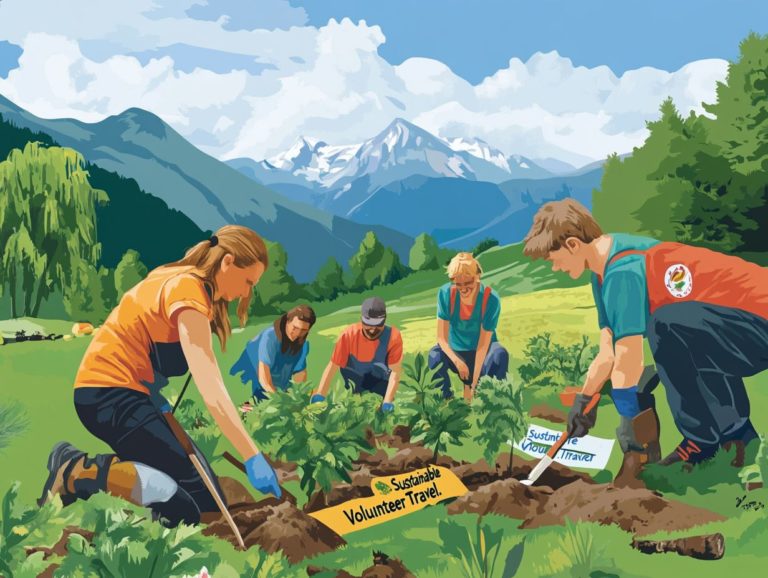5 Ways to Minimize Your Travel Impact
Traveling invites you to immerse yourself in new experiences and cultures, while also carrying a significant responsibility toward the planet.
As you embark on your journeys, exploring sustainably becomes increasingly important. Understanding how to minimize your travel impact is now more crucial than ever.
This article presents five practical strategies for eco-friendly adventures. From choosing green accommodations to supporting local businesses, each tip is designed to enrich your travel experience while protecting the environment.
Discover how to travel with intention and leave a positive impression on the world.
Contents
- Key Takeaways:
- 1. Choose Eco-Friendly Stays
- 2. Pack Light and Responsibly
- 3. Use Public Transportation or Sustainable Modes of Travel
- 4. Support Local Businesses and Communities
- 5. Leave No Trace and Practice Responsible Tourism
- Why Is It Important to Minimize Your Travel Impact?
- Frequently Asked Questions
- What are 5 ways to minimize your travel impact?
- How does choosing sustainable transportation help minimize your travel impact?
- Why is packing lightly important in minimizing your travel impact?
- How can staying at eco-friendly accommodations help minimize your travel impact?
- Why is it important to support local businesses when traveling?
- What are some ways to offset your carbon emissions while traveling?
Key Takeaways:

- Choose eco-friendly accommodations to minimize impact and support sustainable tourism.
- Packing light and responsibly reduces carbon emissions and promotes sustainable travel practices.
- Use public transportation or sustainable modes of travel to lower your carbon footprint and engage with local communities.
1. Choose Eco-Friendly Stays
Selecting eco-friendly accommodations is essential for sustainable travel. This choice minimizes your carbon footprint and supports local communities, promoting environmental sustainability through responsible practices like using renewable energy sources and reducing waste.
Explore options that align with these principles, such as charming eco-lodges nestled in nature, innovative sustainable hotels designed with cutting-edge green technology, or immersive camping experiences that emphasize minimal environmental impact.
These accommodations source materials locally, hire residents from the area, and participate in community projects, fostering economic growth. Many are dedicated to preserving cultural heritage, offering insights into traditional practices and local customs.
By prioritizing conservation efforts, your eco-friendly choices protect wildlife and their habitats. Each stay becomes not just a vacation, but a meaningful contribution to the planet.
2. Pack Light and Responsibly
Packing light and responsibly helps reduce carbon emissions during your journey and encourages eco-conscious choices, such as minimizing plastic waste and avoiding single-use plastics.
Select versatile clothing that can be mixed and matched to significantly reduce the number of items you need. Choosing lightweight luggage simplifies your travels, making it easier to navigate various modes of transportation.
Incorporate reusable items, like water bottles and tote bags, to save space and combat environmental pollution. This mindful packing strategy fosters a deeper connection with your travel experience and the planet, leading to a more enriching adventure that aligns with sustainable practices.
3. Use Public Transportation or Sustainable Modes of Travel
Using public transportation or other sustainable travel modes is a powerful way to reduce carbon emissions. This practice not only supports environmental sustainability but also uplifts local communities, allowing you to travel like a local.
Opting for buses, trains, biking, or walking lowers your carbon footprint and lets you dive into the vibrant tapestry of local life. Taking public transport offers chances to witness the daily routines of residents, enjoy tempting street food, and engage with locals who share insights into their culture.
Biking along scenic routes helps you appreciate breathtaking landscapes at a leisurely pace, while walking opens doors to spontaneous encounters leading to delightful discoveries within a community. These travel methods enrich your experience, deepening your connection to the places you visit and fostering a more authentic understanding of local customs.
Now is the time to take the first step toward sustainable travel!
4. Support Local Businesses and Communities

Supporting local businesses and communities is essential to sustainable tourism, which is travel that helps protect the environment and supports local communities. By doing so, you foster community growth, strengthen local economies, and unlock unique experiences through locally sourced food and authentic cultural exchanges.
When you dine at local restaurants, you satisfy your taste buds with fresh, regional cuisine while enriching the lives of neighborhood chefs and service staff. Shopping at community markets supports artisans and small vendors, helping to create a vibrant local culture. Engaging in local events cultivates a sense of belonging and encourages social interactions among residents and visitors.
Every choice you make leaves a positive mark on the community, enhancing social ties, preserving traditions, and promoting eco-friendly practices. By opting to support businesses rooted in their surroundings, you join a collective effort toward economic and social sustainability.
5. Leave No Trace and Practice Responsible Tourism
Practicing responsible tourism and adhering to ‘Leave No Trace’ principles is essential for preserving the environment. These practices ensure that future generations can enjoy the natural and cultural treasures our planet offers while encouraging volunteering and tree-planting initiatives.
By weaving these guidelines into your travel planning, you enable yourself to make informed choices that protect the landscapes you hold dear. The seven principles include:
- Planning ahead,
- Sticking to designated trails,
- Respecting wildlife,
- Minimizing campfire impacts each of which resonates during activities like hiking, camping, or visiting national parks.
When you hike, choosing established paths helps prevent erosion. Proper waste disposal keeps the environment clean. Opting for eco-friendly products, such as biodegradable soaps and reusable containers, can significantly reduce your footprint.
Engaging in community initiatives enhances your commitment to these environmentally friendly practices. It creates a ripple effect, inspiring others to follow your lead.
Why Is It Important to Minimize Your Travel Impact?
Minimizing your travel impact is crucial for maintaining environmental sustainability and actively combating climate change. By doing so, you help reduce carbon emissions and protect local ecosystems for future generations.
Travel brings a range of environmental challenges, including air and noise pollution from transportation and the disruption of natural habitats due to infrastructure development. The surge of tourists can lead to increased waste, resource depletion, and added stress on local wildlife.
By adopting responsible travel practices like choosing eco-friendly accommodations, using public transportation, and supporting local conservation efforts you can significantly lessen your ecological footprint. Awareness and action are crucial; even small changes can contribute to the well-being of our planet, ensuring its beauty remains intact for years to come.
What Are the Environmental Impacts of Travel?
The environmental impacts of travel are significant, encompassing increased carbon emissions, pollution of natural ecosystems, and threats to wildlife. This highlights the urgent need for conservation efforts and sustainable tourism practices.
As you explore the globe, the demand for air travel rises, contributing to greenhouse gas emissions. Over-tourism often results in overcrowded destinations, straining local resources and leading to habitat destruction. These pressures can deplete vital water sources and disrupt local wildlife.
Fostering awareness about these pressing issues enables informed choices. Consider opting for eco-friendly accommodations, supporting local communities, and prioritizing destinations that embrace sustainability. Join us in transforming travel for a sustainable future!
How Can Travelers Reduce Their Carbon Footprint?

You can make a big difference in reducing your carbon footprint by embracing sustainable travel practices. Consider choosing eco-friendly accommodations and utilizing public transportation.
Also, make conscious decisions about your travel plans and activities. Whenever possible, opt for direct flights to minimize fuel consumption and the emissions associated with layovers.
Packing compact luggage not only lightens the load on planes but also encourages a mindful approach to what essentials you truly need.
By indulging in local food options rather than international chains, you support regional economies while cutting down on the distance food travels from production to consumption, often referred to as food miles.
Participating in eco-conscious excursions, like guided nature hikes or wildlife volunteering, allows you to contribute positively to the environment.
Implementing these specific actions can elevate your travel experiences while actively participating in the protection of our planet.
What Are Some Sustainable Travel Practices?
Sustainable travel practices encompass a variety of responsible approaches that minimize waste, support local communities, and protect the environment while enjoying your adventures.
For instance, by selecting local experiences such as cooking classes with native chefs or choosing eco-friendly accommodations you contribute to the economic stability of the areas you explore.
Volunteering for local conservation projects not only fosters direct engagement with the community but also enables you to leave a positive mark.
Another enriching option is to participate in tree-planting initiatives, which help combat climate change and enhance biodiversity. Choosing ethical destinations prioritizes sustainability, cultural preservation, and the welfare of local populations.
This approach fosters a more responsible and enriching experience for everyone involved.
How Can Travelers Support Local Communities?
You can make a meaningful impact on local communities by embracing sustainable tourism practices that celebrate cultural heritage and support local businesses.
By joining cultural exchange programs, you ll immerse yourself in the rich tapestry of local traditions while building authentic connections with residents. Supporting local artisans preserves traditional crafts and enables these creators economically.
Responsible engagement is essential; it requires a keen awareness of cultural sensitivities and a commitment to ensuring that your contributions genuinely benefit the community.
You can take part in activities such as:
- Workshops – Engage in hands-on learning experiences
- Attending local festivals – Celebrate and understand local culture
- Volunteering for local NGOs – Make a tangible difference for the community
These experiences will help strengthen bonds and leave a lasting, positive impression on the places you visit.
What Are Some Common Mistakes Made by Travelers That Can Harm the Environment?
Common mistakes made by travelers such as using single-use plastics, contributing to over-tourism, and neglecting local customs can significantly harm the environment and undermine vital conservation efforts.
For instance, when you choose plastic water bottles over reusable alternatives, you inadvertently increase waste that can pollute oceans and harm marine life.
Over-tourism often leads to the degradation of natural sites, making them less accessible and enjoyable for future visitors. Ignoring local customs can alienate communities and diminish the cultural richness that initially drew you to explore these destinations.
To mitigate these impacts, it s essential to educate yourself on sustainable practices. Embrace local cuisines and traditions, and prioritize eco-friendly transportation methods during your journeys.
Frequently Asked Questions

Q: How can I make my travel more sustainable?
A: You can choose eco-friendly accommodations, reduce waste, and engage in local experiences.
Q: What should I avoid while traveling to be more eco-friendly?
A: Avoid single-use plastics, over-tourism, and practices that disregard local customs.
What are 5 ways to minimize your travel impact?
-
Choose sustainable transportation options like biking, walking, or public transport when possible.
-
Pack lightly. This reduces luggage weight and minimizes your trip’s greenhouse gas emissions.
-
Stay at eco-friendly places! They lead the way in sustainability with renewable energy and conservation efforts.
-
Support local businesses. By buying locally-sourced goods, you help reduce transportation impact and boost the local economy!
-
Act now! Offset your carbon emissions by joining a carbon offset program or donating to environmental initiatives.
How does choosing sustainable transportation help minimize your travel impact?
Using sustainable transportation options, like biking or public transport, significantly reduces your carbon emissions and helps clean the air. These modes emit far fewer greenhouse gases than driving a car.
Why is packing lightly important in minimizing your travel impact?
Light luggage reduces airplane weight, which lowers fuel consumption and carbon emissions. Packing light also makes it easier to take public transport or walk to your accommodations, further cutting your travel impact.
How can staying at eco-friendly accommodations help minimize your travel impact?
Eco-friendly accommodations implement sustainable practices, using renewable energy and eco-friendly products while conserving water and energy. Support their eco-friendly efforts and promote tourism that respects our planet!
Why is it important to support local businesses when traveling?
Supporting local businesses benefits the local economy and reduces transportation-related emissions. By purchasing locally-sourced goods, you minimize product travel distances, cutting carbon emissions and endorsing sustainable practices in the community.
What are some ways to offset your carbon emissions while traveling?
You can join a carbon offset program to invest in projects that lower carbon emissions or donate to initiatives working to combat climate change. These actions help balance your travel’s carbon footprint and promote a healthier planet!






